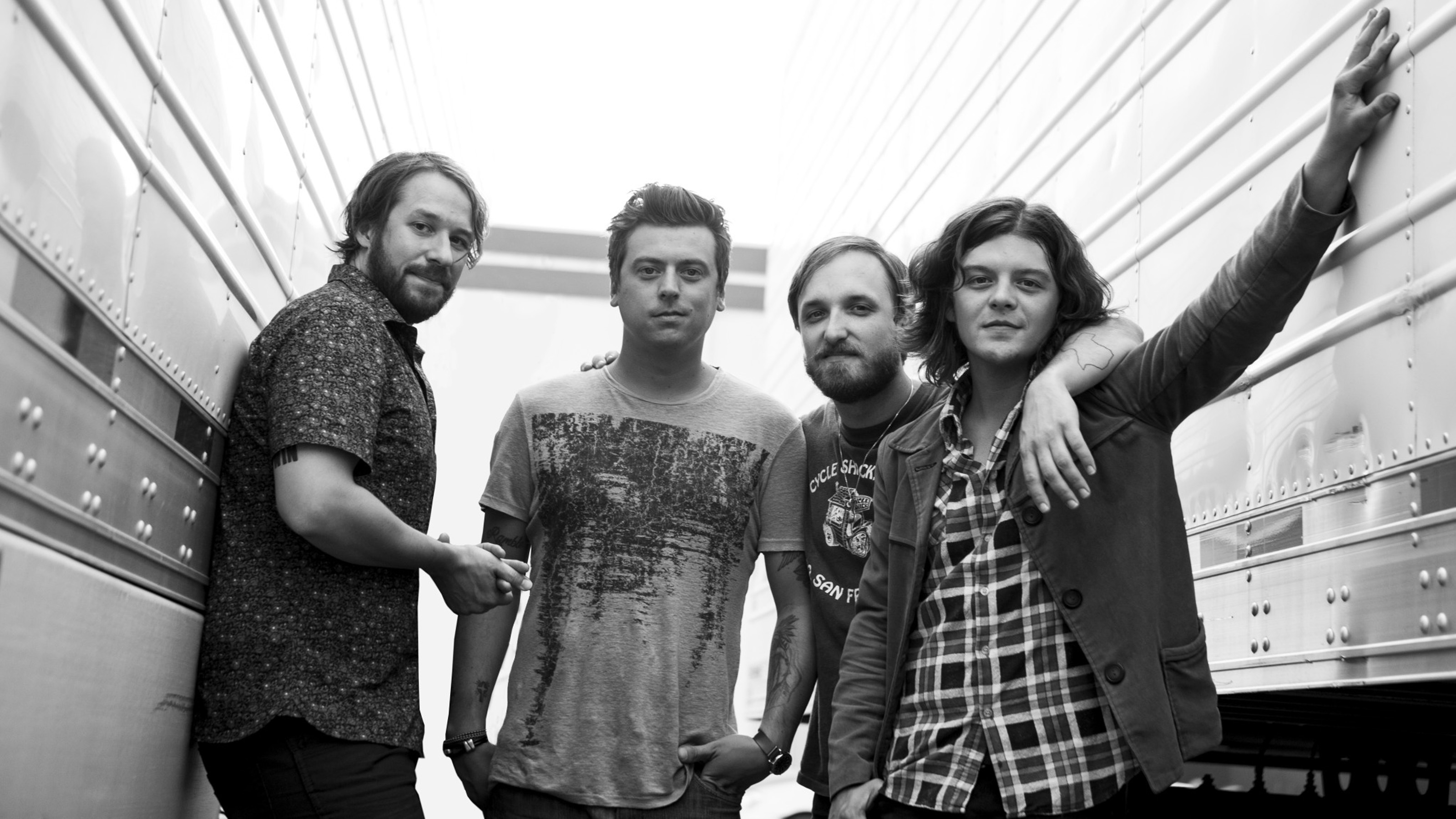Room 8 at The Joshua Tree Inn—the site where Gram Parsons spent his final hours, dying of a drug and alcohol overdose at the age of twenty-six in 1973—is a modestly adorned space. Rented out more for its history than any kind of luxury at $114 a night, the small sleeping quarters includes a smattering of memorabilia in honor of the influential artist, including photographs and concert bills. There’s even a guestbook for visitors to leave messages for Parsons’ rumored ghost. It was in this room—on Parsons’ birthday no less—that Nashville quartet The Wild Feathers crammed together and wrote the title track to their sophomore album, Lonely Is a Lifetime.
The band had only decided to make the pilgrimage the day before while visiting LA. At the time, members Ricky Young (guitar/vocals), Taylor Burns (guitar/vocals), Joel King (bass/vocals), and Ben Dumas (drums) hardly expected that such a frequently visited site would yield any kind of last-minute vacancy. “We were like, ‘It’s going to be so booked up,’” recalls Young. Somehow, the room wasn’t occupied. After grabbing a few drinks from a nearby watering hole, it took the band all of forty-five minutes to put together the ballad’s campfire vocal harmonies and subdued guitar work. “Joshua Tree—it’s very quiet,” says Young. “It’s a very still place. We kind of joked about how it felt like Gram was in the room.”
No matter where they are, The Wild Feathers have a way of channeling the influential spirit of their musical predecessors, creating a feeling of familiarity that never feels apologetic. Whether these cues are coming from the Eagles (“My mom and dad are huge Eagles fans—one of my first musical memories is hearing ‘Tequila Sunrise,’” says Young), The Band (“The organic chemistry between those players is what every band should strive to do”), or Tom Petty (“His live shows are like a greatest hits record”), The Wild Feathers have no qualms about refurbishing the past into something modernly enjoyable.
“We kind of joked about how it felt like Gram was in the room.”
“You’re a fool to say ‘we’re just doing our own thing and it’s completely original,’” says Young. “You’re just lying. It’s best to just acknowledge it and apply it. We like to joke about the fact that what makes us sound like The Wild Feathers is our failed attempts to try to rip off anybody else. We’re only so good at what we do. We’re not reinventing the wheel. We’re just playing what we want to play and using what we want to use as inspiration. It’s just what it is.”
Which isn’t to say that Wild Feathers are mere replicators painting their own versions of other people’s masterpieces. “Obviously you can’t do the exact same thing,” Young says. “You try to put yourself in the mindspace of where these artists were. I like to think: what would McCartney do? What would The Replacements do with this? It’s not like you want to do that exactly, but you try to think like them.”
It’s perhaps due to their reverence for their musical forebears that following the release of their self-titled debut in 2013, The Wild Feathers found themselves on tours opening for the likes of Willie Nelson, Paul Simon, and even Bob Dylan. While Young says Dylan lived up to his notorious absenteeism backstage (“He’s like a mist blowing through the room”), Nelson and his Family band were more than happy to lend some of their personal and professional experience to the young group. Good or bad, Young says, “You try to soak everything in.”
Unable to turn away such great opportunities—and with their own headlining schedule to maintain—The Wild Feathers spent an inordinate amount of time on the road in the wake of their first record. Like many bands before them, this equally exhilarating and exhausting trek would serve as the primary inspiration for their follow-up.
“You’re never going to be completely content. You’re never going to be completely un-alone, even in a group of people.”
“For us, as much as we travel and we talk about how we’re in our own little world, our own little bubble, just kind of bouncing around the highway, there’s a theme on this record of a longing and a desperation to find something,” says Young. “The title kind of says it itself, and it’s just acknowledging the fact that this is the way it is. You’re never going to be completely content. You’re never going to be completely un-alone, even in a group of people. We’re away from the things that are comfortable, like our beds and showers and our wives and our girlfriends, and it’s not always great. Half the time it’s not—sometimes more than half. But it’s the best job we ever had. We’re not complaining. I think this record definitely captures what it was like being on the road for those two-and-a-half years and that feeling of just wanting to get somewhere where you feel safe—a longing for comfort, if that makes sense.”
Ultimately, The Wild Feathers see their musical output not as some boisterous testament to boundary-pushing experimentation, but to the small personal growth that can occur in the emulation of others. “I think we’re more familiar with who we are as human beings and writers and musicians,” says Young. “We just want to be a rock and roll band that can do different things.” FL







